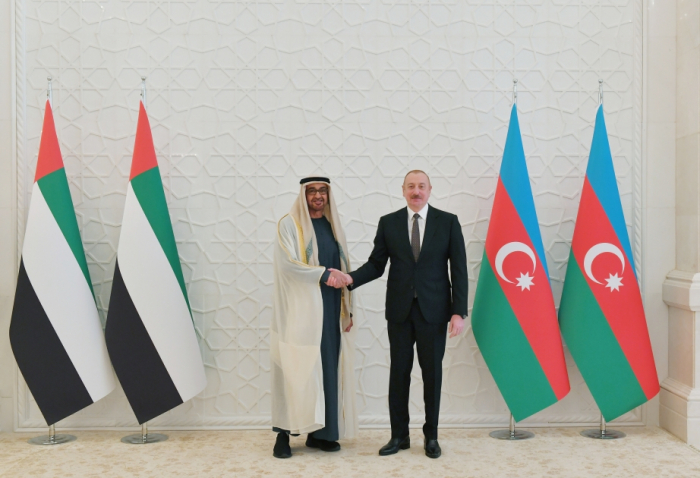The ongoing crisis in the world has changed the traditional world geopolitics, therefore states are searching for reliable partners on furthering their foreign policy in various regions.
The friendship between Azerbaijan and the United Arab Emirates (UAE) dates back to 1990s, when the UAE recognized the independence of the Republic of Azerbaijan on December 26, 1991. The UAE was among the first Muslim states to recognize Azerbaijan’s independence. It was very important to establish a strong relationship and strengthen cooperation with the UAE, therefore on December 13, 1994 within the framework of the Summit of the Heads of States and Governments of the member states of the OIC held in Casablanca, the former President and the National Leader of Azerbaijan Heydar Aliyev met with the President of the United Arab Emirates Sheikh Zayed bin Sultan Al Nahyan. Furthermore, during the former Garabagh war between Azerbaijan and Armenia, the UAE always supported Azerbaijani position in this sensitive issue
The current level of the bilateral relationship between Azerbaijan and the UAE has progressed into a “strategic partnership” grounded in economy, tourism, security, culture and energy. During the recent official visit of the President of the UAE and the ruler of Abu Dhabi Sheikh Mohamed bin Zayed Al Nahyan to Azerbaijan on January 8 and 9, 2024, the strategic importance of strengthening of bilateral ties between two Muslim nations was especially underlined.
Touching upon bilateral economic relations, the “Azerbaijan UAE Joint Intergovernmental Commission on economic, trade and technical cooperation” deepens economic cooperation and opens up new opportunities for both nations. In January-July 2023, the trade turnover between the two states amounted to $58.5 million, which was 21.1 percent more than the corresponding period of 2022.
Moreover, the growing energy partnership between Azerbaijan and the UAE further supports bilateral economic ties. Azerbaijan, as a resource-rich country in the Caspian region, has proved itself as a reliable energy partner for many states. Baku implemented successfully various inter-regional energy projects which link the global energy markets to the Caspian region. Although these two countries are fossil-fuel-rich countries, and their energy mix is heavily concentrated in fossil fuels such as crude oil and natural gas, Baku and Abu Dhabi pay special attention to sustainable development, including the promotion of decarbonization and power generation from renewable energy sources.
Towards this end, Azerbaijan has already started to develop its renewable energy capacity, and therefore cooperation with the UAE in this sector plays a significant role in power generation from renewable energy sources. Noteworthy to note that the Azerbaijani government signed important agreements with the UAE’s global renewables company Masdar on the implementation of green energy projects in the country. Masdar has signed agreements for solar and onshore wind projects with a total capacity of 1GW in Azerbaijan, following the inauguration of the 230 MW Garadagh Solar Park, the region’s largest operational solar plant. The plant was built at the expense of foreign investment worth $262 million. The strategic agreements cover the progression of the first phase of a 10 GW pipeline of renewable energy projects in the country, signed in June 2022.
Also, Saudi-listed ACWA Power agreed to develop 500 MW renewable energy projects in Azerbaijan’s Nakhchivan Autonomous Republic with Masdar and the State Oil Company of Azerbaijan Republic (SOCAR). In addition, Masdar has signed agreements to develop integrated offshore wind and green hydrogen projects and onshore wind and solar projects with a total combined capacity of 4 GW. All the aforementioned green energy projects will support Azerbaijan’s goal of increasing the share of electricity in the installed capacity to 30 percent by 2030.
To foster the UAE-Azerbaijan economic and energy cooperation, four important documents such as MOU between the Ministry of Investment of the United Arab Emirates and the Ministry of Energy of the Republic of Azerbaijan on investment cooperation on electricity transmission projects, Framework Agreement on Strategic Collaboration in further strengthening renewable and clean energy capacities of Azerbaijan and enabling Green Energy Export Operations and Calendar of Actions (roadmap) for the construction of onshore solar and wind power plants with a capacity of 1 GW, Strategic Partnership Agreement between SOCAR and ADNOC, were signed during the January visit of Sheikh Mohamed bin Zayed Al Nahyan to Azerbaijan.
These documents open new opportunities for the future cooperation as both nations eye deeper strategic partnership. The MOU envisages the creation of a framework for investment cooperation in the energy sector, especially in electricity transmission projects, the development of the network, the exchange of technical knowledge and experience. The strategic cooperation document covers cooperation and investment opportunities in new areas such as the rooftop solar projects, green hydrogen, green ammonia, synthetic methane, sustainable aviation fuel production and export of green energy, along with 2 GW solar and 2 GW wind onshore projects, 6 GW offshore wind energy. Calendar of Actions (roadmap) for the construction of 1 GW solar and wind onshore projects to be installed in Azerbaijan reflects the implementation measures of 2 solar and 1 wind energy projects for 2024-2027.
Summing up, all the aforementioned priority areas of cooperation show that the UAE supports Azerbaijani initiatives in the South Caucasus. Azerbaijan is an ideal partner for the UAE to expand its economic interests in the Caspian region. Given that Azerbaijan, Georgia, Romania, and Hungary support the “Green Energy Corridor” from the South Caucasus to Europe, it creates an attractive environment for UAE’s companies to invest in renewable energy in Azerbaijan. Last but not least, as Baku will host the 29th Conference of Parties (COP29) to the UN Framework Convention on Climate Change after COP28 in Dubai, the UAE can share its valuable experience with Azerbaijan, which will be the first country in the region to host UN climate summit.
AzVision.az
More about:
















































